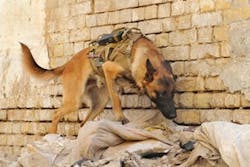Canines are one of the best partners that we can have. I don’t want to sound demeaning, but they are also a great tool. The nose of a canine can sniff out suspects, drugs and explosives. Agencies around the world tend to spend thousands of dollars for a canine, most of the time that doesn’t include any training. What if there was a way to reduce the initial cost of acquiring a canine and training, which in this economy and reduced budgets that would be a big deal to the administrators.
The United States military spends countless amounts of money and hours training our soldiers to the highest of standards; well they do the same with the Military Working Dog (MWD). I don’t know a lot about MWD’s, but I do know that they receive obedience training and then whatever training for a specific discipline, like explosives, some may have apprehension training, just like police canines. With the military engagements that the U.S. has been in in the last 10 years or so, I’m sure many of the MWD’s returning from the front lines, have explosives training. Why does this matter, according to 106th Congress 2d Session H.R. 5314, “The Secretary of Defense shall make a MWD of the Department of Defense available for adoption by a person or entity (law enforcement agencies, former handlers of these dogs, and other persons capable of humanely caring for these dogs) at the end of the dog’s useful working life or when the dog is otherwise excess to the needs of the Department, unless the dog has been determined to be unsuitable for adoption.”
You may ask how old these MWD’s are when they are taken out of service, well much of what I have dug up online, many of them are only a few years old, which leave plenty of working years in left in them. Sometimes it is health issues or injuries that take them out of service, which would still make them a great pet, but I’m talking more about continuing their service life. Why they take some of them out of service when there are no apparent health issues or injuries, who knows, but there are many returning MWD’s that would be prime candidates to be Police Canines. Just think you could get a MWD for almost nothing except the expense of traveling to select the MWD you want and transporting it back.
So you have adopted a highly trained MWD, now what? Well now you need to assign it a handler and start training. Most likely you wouldn’t have to go through the entire training course with it, but more so of getting the handler familiar with the canine and the canine familiar with the handler. Of course you’re going to want to test it to make sure all of its obedience is spot on and test any other training it may have received. Then you need to get the canine certified as you would any other police canine.
Once you adopt a MWD, it could be matter of a few weeks before it is working the streets with a new handler and 10’s of thousands of dollars saved. Compare that to a green canine that you’re going to spend thousands of dollars on to get, several more thousand if not more than 10 thousand dollars and several months on training, for a canine that may wash out of the program. As stated before, we know how stringent the military standards are, so if a MWD wasn’t washed out of the training, there is a much higher probability that it won’t wash out of police training compared to a green canine.
For police administrators, adopting a MWD should make a lot of sense; the MWD isn’t getting euthanized, your agency is saving a lot of time and money. And, for those agencies that have their own kennels and canine breeding program, MWD’s would be excellent choices to add to the program.
For more information on adopting a Military Working Dog, here are a few resources:
- U.S. Government Printing Office – 106th Congress 2d Session H.R. 5314
- The United States War Dogs Association, Inc.
- Military Working Dog Adoptions
Stay Safe!
About the author:
Steve Forgues started his career over 18 years ago in Arizona. Over the years, Forgues has worked contract security, police, corrections and tactical operations. Forgues has been an instructor in various disciplines since 1998, and has been working and training with canines since 2000. Forgues has also been writing for law enforcement since 2005. He is currently working as a police officer and firefighter in Pennsylvania.

Steven Forgues
Steve Forgues started his career over 18 years ago in Arizona. Over the years, Forgues has worked contract security, police, corrections and tactical operations. Forgues has been an instructor in various disciplines since 1998, and has been working and training with canines since 2000. Forgues has also been writing for law enforcement since 2005. He is currently working as a police officer and firefighter in Pennsylvania.



